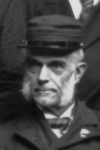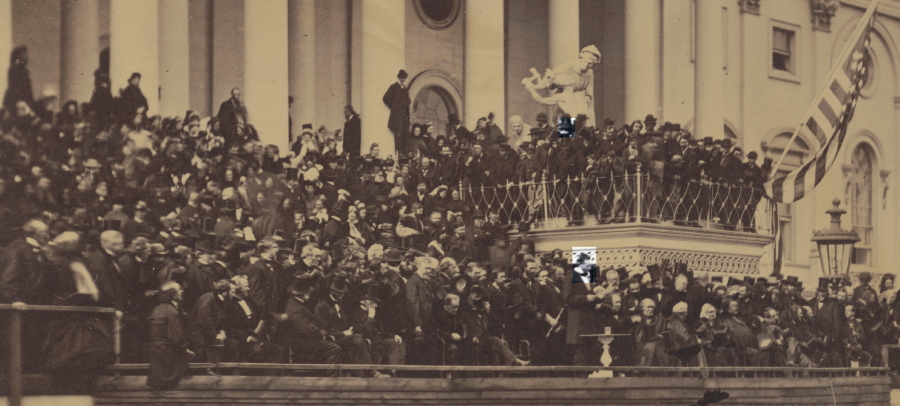 I am always looking for connections to Capitol Hill in events that took place around D.C. over the years, with the Lincoln assassination being one of the best-known. Imagine my surprise when I discovered that a local man had actually helped stop a previous attempt on Lincoln’s life by John Wilkes Booth.
I am always looking for connections to Capitol Hill in events that took place around D.C. over the years, with the Lincoln assassination being one of the best-known. Imagine my surprise when I discovered that a local man had actually helped stop a previous attempt on Lincoln’s life by John Wilkes Booth.
On March 4, 1865, Abraham Lincoln was sworn as President in for the second time. As was standard at the time, the inauguration took place on the east front of the Capitol. In those days, the rotunda under the Capitol Dome opened directly onto the porch on which Lincoln was to speak. Furthermore, the Capitol was open to all, so a contingent of police officers stood just inside the rotunda, keeping open a passage for the President to reach the dais.
William J. Belshaw of the Capitol Police and a Capitol Hill resident himself, told what happened next in an affidavit filed in 1876:
That he saw a stranger break through the line in a very determined and excited manner and start for the east door through which the Judges of the Supreme Court and the President had just passed. Lieutenant Westfall ordered him back, but he refused to go when he was seized by Westfall and a severe struggle ensued. The east door was closed; assistance came to Westfall and the stranger was forced back into the crowd.
Belshaw also said that the man that Westfall struggled with was none other than John Wilkes Booth. Further affidavits from around the same time all say the same thing: That Booth had been in the Capitol, that he had attempted to follow the President out the east door of the Rotunda and had been stopped by Westfall, who was then assisted by a number of others. Booth was released, however, because Benjamin Brown French –who was in charge in the Rotunda– could not be sure that Booth, who claimed loudly that he had every right to be there, was not one of the newly elected members of Congress. Booth was later seen outside the Capitol, watching Lincoln speak.

Alexander Gardner’s famous picture of Lincoln speaking at his 2nd inaugural. Lincoln and Booth are highlighted. Other pictures of the same scene make it clear that what is here simply a top-hatted blur is, in fact, the presidential assassin. (LOC)
But who was the man who stopped him?
John W. Westfall was born on August 25, 1827 in New York State. He married Alice R. in 1855, and they moved to Washington right around the outbreak of the Civil War, living at First and C NE. Westfall became an officer in the Capitol police at the princely salary of $110 per month. The first few years of his time there were quiet – or at least did nothing to get mentions of him into the newspaper.
Even after his moment of glory –the significance of which was not noted until after the Lincoln assassination in a letter French wrote to his son Francis, and publicly not at all– little changed for him, other than that he was promoted to the newly created rank of Lieutenant, with the concomitant raise of $15/month.
Under ordinary circumstances, this should have been enough to ensure his continued employment, if not an outright sinecure, for the rest of his life. Sadly, it was not to be, as we will see next week.
